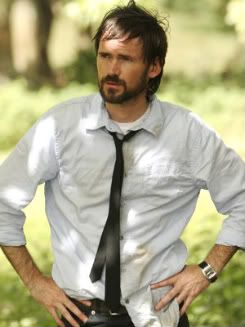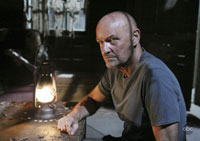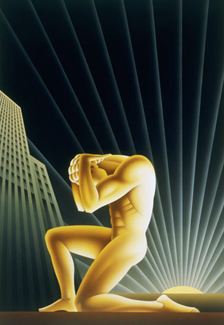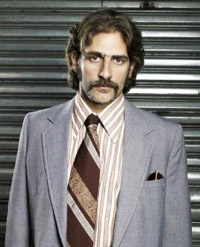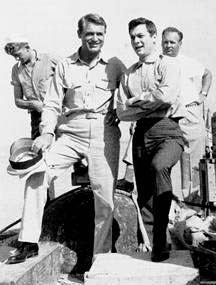The post-war 40s was a time of transition in film. Of course, in Europe, it was a new blossoming, most notably with neo-realism. In Hollywood, newer, tougher stars (often in film noir) were replacing the big names of the 30s, but the threat of TV was starting to knock on the door. I can usually spot the era a film is made within a few seconds, but Hollywood late-40s aren't quite yet the 50s, but haven't fully dropped what came before either. It's an odd, in-between time. (Not a great time, in my book, BTW.)
Anyway, my friend Jesse Walker is now
naming his top ten films from 1949, and it's an interesting list.
He likes the big Oscar winner
All The King's Men, though it doesn't make his list. I'm not so thrilled. This was an era where Hollywood would take on "serious" subjects, but was prevented (by the Production Code, among other things) from going deep enough.
Anyway, here's his top ten, and my comments:
1.
OrpheusLike the film a lot. Best of the year, I don't know, but it should be on the list.

2.
The Third ManOne of the most overrated films of all. Clunkily written and directed. The stuff with Orson Welles is great. Too bad it's only a small fraction of the film.
3.
Stray DogThis is one of the few Kurosawa films I haven't seen. I like most of his stuff, and I expect I'd like this one.
4.
White HeatAlmost all Cagney's best stuff is in the 1930s, so it's interesting to see what amounts to a comeback, and may be his best performance.
5.
They Live By NightRay is interesting, but his films usually fall short for me. I don't recall loving this film, but I haven't seen it in years. Maybe I should give it another shot.
6.
Little Rural Riding HoodIf you're gonna pick shorts, might as well be one of Tex Avery's best.
7.
Kind Hearts and CoronetsThis may be the most overrated of Ealing comedies, but it's still pretty good.
8.
Les Enfants TerriblesI didn't realize this was the same year as Orpheus. Another fine film.
9.
Passport to PimlicoMore Ealing. Also fine.
10.
Thieves' HighwayNot one of Dassin's better known titles. I generally like his stuff and I want to catch this some day.
Jesse's honorable mentions:
11.
The Set-Up (Robert Wise)
12.
Bad Luck Blackie (Tex Avery)
13.
Long-Haired Hare (Chuck Jones)
14.
I Was a Male War Bride (Howard Hawks)
15.
Blood of the Beasts (Georges Franju)
16.
Señor Droopy (Tex Avery)
17.
Twelve O'Clock High (Henry King)
18.
Flamingo Road (Michael Curtiz)
19.
The Heiress (William Wyler)
20.
Begone Dull Care (Norman McLaren, Evelyn Lambart)
The Set-Up is one of the best boxing movies ever made.
The Avery and Chuck Jones stuff I love, but once you start listing their shorts I don't know where you stop.
Howard Hawks is one of my favorite directors, Cary Grant one of my favorite stars, and
War Bride was a huge hit in its day, but it's mostly a dud. (Hawks three films with Grant before America entered the war are all classics--his two comedies after the war suggest Hawks had lost a step.)
Numbers 17, 18 and 19 and basic classy Hollywood productions, which have their various moments, but none of which do much for me.
Sorry, haven't seen 15 or 20.
Here are some movies from 1949 that might have made my top ten:
The Big Steal,
Jour de fête (the first of Tati's great four),
Whisky Galore! (if you got the other Ealings, why not this one?)
Here are some I liked, at least in part. (I'm sure I'm forgetting a bunch of films noir and foreign stuff):
Abbott and Costello Meet the Killer, Boris Karloff,
The Barkleys of Broadway (a far cry from A&R's RKO stuff, but still fun),
I Shot Jesse James,
Gun Crazy (maybe even top ten),
Champion,
In the Good Old Summertime (mostly pretty weak, actually, and based on one of the best films ever made),
The Inspector General,
 It's a Great Feeling
It's a Great Feeling,
A Letter to Three Wives (Mankiewicz was highly over-honored in his day, but there's still some fun here),
Intruder in the Dust,
Jigsaw,
Mighty Joe Young,
My Friend Irma (for introducing Martin and Lewis),
On the Town (highly overrated, but worthwhile),
Neptune's Daughter,
The Stratton Story,
Take Me Out to the Ball Game,
Sorrowful Jones,
Jolson Sings Again,
It Happens Every Spring,
The Beautiful Blonde from Bashful Bend (actually, by far the the worst thing Preston Sturges ever did),
The Fighting Kentuckian (just to see Oliver Hardy alone),
The Fountainhead (terrible, but fascinating)
Here are films that at least some people found notable at the time:
Adam's Rib,
Criss Cross,
Edward, My Son,
Home of the Brave,
Pinky,
Sands of Iwo Jima,
The Secret Garden,
She Wore a Yellow RibbonPS It's a few days later and I just watched
Thieves' Highway. Not bad. But I think I like
The Big Steal better.




